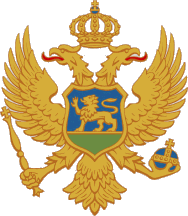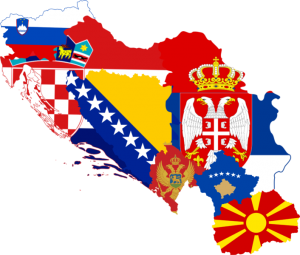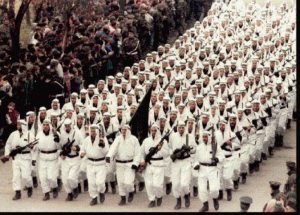
Views: 964

There was international jubilation when Montenegro seceded from its union with Serbia in 2006 after a controversial referendum. The Referendum Law prevented Montenegrins living and registered in Serbia from voting in the referendum, ensuring that tens of thousands of Montenegrins, in a country of only 622,000, who would have voted to remain the union could not vote in favour of maintaining it.
It must be remembered that state-paid workers like teachers and police were told by the Democratic Party of Socialists (DPS) leader Miodrag Vuković before the referendum May 2006, that someone “cannot work for the state and vote against it,” something objectively untrue. The pressure for independence was strong and in 2007, Jovan Markuš, a politician, journalist and historian, published a 1,290-page document that revealed the irregularities of the referendum.
There is little doubt that the dislocation of Montenegro from its Serbian motherland is part of a wider and continued effort to surround and isolate Serbia for its continued defiance against NATO and maintaining strong relations with Russia. This is why the Prime Minister of occupied Kosovo, Agim Çeku, announced that Kosovo would follow Montenegro’s example to achieve independence, saying “This is the last act of the historic liquidation of Yugoslavia.” Kosovo ultimately declared on February 17, 2008 in its pursuit of a Greater Albania.
Immediately the people of the Serbian-majority autonomous Republika Srpska in Bosnia and Herzegovina demanded their own referendum for independence or union with Serbia. However, this was ultimately withdrawn because according to Milorad Dodik, the prime minister of Republika Srpska, there was significant international pressure and opposition, demonstrating that Serbia is always to be isolated and pressurized, so long as it continues its close relations with Russia.
Although Montenegro became independent in 2006, it took only until December 2009 for the country to reach the final process of becoming a NATO member, the Membership Action Plan, before officially becoming a full-fledged member on June 5, 2017. This was a rapid process that has not been afforded to other aspiring members like Georgia. This is on top of working towards the goal of becoming a European Union member. It appears peripherally that everything is going well in integrating Montenegro into Atlanticist and European interests and projects, particularly those against Russia. But the country has been embroiled in constant political turmoil since 2015 with strong anti-government protests and corruption cases.
The protests were spearheaded by the opposition Democratic Front, demanding a transitional government which would organise next parliamentary elections, to end corruption and the resignation of then Prime Minister Milo Đukanović, who has held leadership positions, either as prime minister or president, in an authoritarian manner since 1990. The anti-government movement finally culminated into anti-NATO protests, with the wider anti-government movement continuing into 2016.
Đukanović and his proxies refused to submit to the anti-NATO movement and on October 16, 2016 on the day of the parliamentary elections, launched a mass arrest of Serbian and Montenegrin citizens on the accusation that they were planning a coup d’état, in which Russian individuals, without evidence as has become standard in Western anti-Russian rhetoric, were allegedly involved. By February of the following year, Montenegrin officials accused Russia of orchestrating the supposed coup attempt that allegedly had the goal of assassinating Đukanović. This was immediately rejected by Moscow.
Although Đukanović left his post in late 2016, a reconciliation between the government and opposition has not been achieved as he continued to chair the DPS, controlling the party with an iron fist. Unsurprising since Đukanović is alleged to have strong links to the mafia and was listed in 2010 as one of the richest world leaders, who is “mysteriously wealthy” with an estimated £10 million. There was little surprise when the Organized Crime and Corruption Reporting Project announced Đukanović as ‘Person of the Year in Organized Crime’ in 2015 as he “built one of the most dedicated kleptocracies and organized crime havens in the world” despite portraying “himself as a progressive, pro-Western leader who recently helped his country join NATO and is on track to join the European Union.”
Although he ruled out the possibility of running as President in 2018, claiming the DPS had strong candidates, he of course lied, and was elected President in April 2018, allowing him to continue his corrupt practises like smuggling, organized crime, privatizations that go to his family like the Prva Banka. It is for this reason that a 2018 Freedom House report classified Montenegro as a Semi-Consolidated Democracy and Received A democracy Score of 3.93 out of 7.
For this reason, the independence of Montenegro is rather just a creation of a mafia state, similarly to neighboring Kosovo. This demonstrates that NATO does not care for authoritarianism and corruption, and rather, its current manifestation is just a continuation of anti-Russianism that is being continued nearly 30 years after the collapse of the Soviet Union. Đukanović had created the Adriatic seaside state into his own personal fiefdom and has never ventured far from complete ownership over Montenegro. NATO, and clearly the EU, simply do not care.
 Montenegro is one of NATO’s marionette states that recognized “independence” of southern province of Serbia – Kosovo and Metohija
Montenegro is one of NATO’s marionette states that recognized “independence” of southern province of Serbia – Kosovo and Metohija
Originally published on 2019-12-09
About the author: Paul Antonopoulos is a Research Fellow at the Center for Syncretic Studies.
Source: BRICS Information Portal
Origins of images: Facebook, Twitter, Wikimedia, Wikipedia, Flickr, Google, Imageinjection, Public Domain & Pinterest.
Read our Disclaimer/Legal Statement!
Donate to Support Us
We would like to ask you to consider a small donation to help our team keep working. We accept no advertising and rely only on you, our readers, to keep us digging the truth on history, global politics and international relations.
[wpedon id=”4696″ align=”left”]
FOLLOW US ON OUR SOCIAL PLATFORMS









